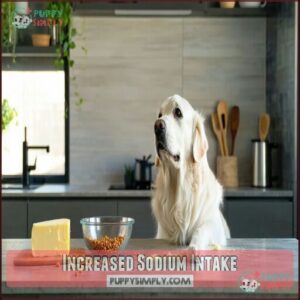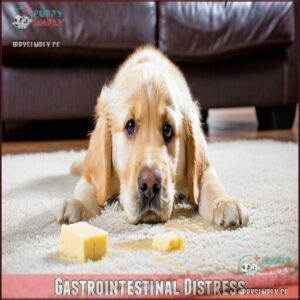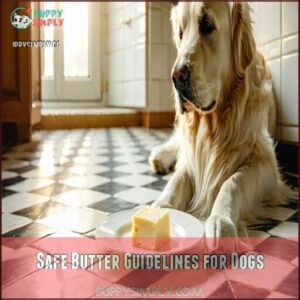This site is supported by our readers. We may earn a commission, at no cost to you, if you purchase through links.
 Dogs shouldn’t eat butter because it’s high in fat and lacks any real nutritional value for them.
Dogs shouldn’t eat butter because it’s high in fat and lacks any real nutritional value for them.
While a small amount likely won’t harm your pup, eating butter can lead to digestive upset, obesity, or even pancreatitis, particularly in dogs sensitive to fatty foods.
Some dogs are also lactose-intolerant, which could worsen stomach troubles.
If your pup managed to swipe some butter off the counter, watch for signs like diarrhea or vomiting, and reach out to your vet if needed.
Instead, stick to healthier fat options like coconut oil or fish oil. Curious about safer treats? There are better alternatives!
Table Of Contents
- Key Takeaways
- Risks of Butter Consumption
- Can Dogs Eat Butter
- Butter Alternatives for Dogs
- Dangers of Butter for Dogs
- Safe Butter Guidelines for Dogs
- Frequently Asked Questions (FAQs)
- Can dogs eat butter?
- Is butter a healthy food?
- What happens if a dog eats butter?
- Can dogs eat vegan butter?
- What should I do if my dog eats butter?
- Can dogs eat butter if they eat margarine?
- Can I add butter to my dog’s rice?
- Why does my dog eat butter?
- Can a dog eat butter if he is a picky eater?
- Is butter harmful to dogs?
- Conclusion
Key Takeaways
- Butter’s high fat content can cause digestive upset, obesity, and pancreatitis, especially in sensitive dogs.
- Small amounts of butter may not be toxic, but it’s not a nutritious or safe option for your dog’s diet.
- Unsalted butter is less risky but still not ideal; healthier alternatives include coconut oil, fish oil, and dog-friendly fruits.
- If your dog eats butter, watch for signs like vomiting or diarrhea and consult your vet if symptoms persist.
Risks of Butter Consumption
Feeding your dog butter can lead to various health risks, mainly due to its high fat content.
Butter may seem harmless, but its high fat content can upset your dog’s digestion and lead to serious health problems.
Issues like digestive upset, weight gain, and even pancreatitis are common concerns associated with its consumption.
High Fat Content
Butter’s high-calorie density, loaded with saturated fats, makes it a challenge for dogs to process.
This digestive burden can trigger serious issues, especially pancreatitis.
To keep your pup safe, remember:
- Limit exposure to high-fat foods like butter.
- Monitor for signs of weight gain or obesity.
- Avoid butter in routine meals.
- Focus on proactive weight management.
Sunflower butter is a safer peanut alternative for dogs with allergies.
Digestive Issues
Dogs with sensitive stomachs or lactose intolerance may struggle to digest butter, leading to upset symptoms like diarrhea, vomiting, or bloating.
Butter can upset sensitive dog stomachs, causing diarrhea, vomiting, or bloating—better to skip it for their comfort and health.
Butter’s high fat content can make digestion harder, disrupting the gut microbiome and causing gastrointestinal distress.
Even though small amounts might seem harmless, regular inclusion of butter in a dog’s diet can trigger digestive issues, impacting dog nutrition and overall health.
Pancreatitis Risk
Some dogs are more prone to pancreatitis, especially after eating high-fat foods, like butter.
This condition causes inflammation in the pancreas and can lead to severe abdominal pain, appetite loss, and vomiting.
Watch for these symptoms:
- Abdominal pain or bloating after consuming butter.
- Vomiting paired with lethargy or appetite changes.
- Immediate veterinary intervention is critical for managing dog health and avoiding complications, which can be severe.
Obesity and Weight Gain
After pancreatitis, consider how high-fat foods like butter contribute to weight gain.
Its calorie density can quickly surpass a dog’s daily needs, especially without proper portion control.
Some breeds with slower metabolic rates are prone to obesity, amplifying butter risks.
If dogs eat butter regularly, weight gain may lead to obesity, which impacts mobility, exercise capacity, and overall health.
Can Dogs Eat Butter
You might wonder: can dogs eat butter? The short answer is yes, but it’s not the healthiest option.
Butter isn’t toxic to dogs, but it’s high in fat and offers little nutritional value. Some dogs may tolerate small amounts without issues, while others might face digestive upset like diarrhea or vomiting.
Lactose concerns and breed sensitivity further complicate the matter; many dogs don’t process dairy well. Serving size matters too—larger dogs may handle a small lick, but even that can pose butter risks for smaller breeds.
Allergic reactions are rare but possible, so pay attention to your pup’s reactions. Ultimately, butter for dogs is best avoided or given sparingly, as it poses more risks than benefits to their health.
For a safer alternative, consider sunflower seed butter, which offers nutritional benefits.
Butter Alternatives for Dogs
If you’re looking for healthier options than butter for your dog, there are plenty of safe, nutritious alternatives worth exploring.
From natural oils to fruits, vegetables, and lean meats, these choices can support your dog’s health without the risks of high-fat foods.
Healthy Oils
Healthy oils like coconut, fish, and olive oil can be great alternatives for your dog’s diet.
They provide omega fatty acids, support a shiny coat, and improve canine nutrition.
Stick to safe portions—start small and watch for reactions.
Dietary integration of these oils enhances pet nutrition while meeting dog dietary needs.
Always choose high-quality oil types for balanced dog nutrition.
Fruits and Vegetables
Switching from oils, fruits and vegetables offer safe ways to enrich your dog’s diet.
Apples, bananas, and carrots provide nutrients like fiber and vitamins, while blueberries pack antioxidant power.
Always stick with safe foods for dogs, avoiding toxic produce like grapes or onions.
Consider other safe fruit options to diversify your dog’s snacks.
Proper preparation—washing, cutting into small pieces, and moderation—ensures your pup enjoys these healthy snacks responsibly.
Lean Meats and Treats
Lean meats like chicken, turkey, or beef are great protein sources for dogs and a smart alternative to butter.
Focus on safe preparation—remove bones, trim fat, and cook without seasoning.
Treat variety matters, so mix lean meats with other safe foods for dogs. Many owners find quality lean meats beneficial for their pets.
Portion control guarantees nutritional value without overfeeding unhealthy dog foods or risking butter toxicity.
Coconut Oil and Fish Oil
Coconut oil and fish oil are great butter alternatives that boost your dog’s health.
Coconut benefits include soothing itchy skin, while fish oil uses range from joint support to better brain health.
Many owners buy coconut oil for their pets.
Stick to small amounts—1/4 teaspoon of coconut oil or 20-55 mg/lb of fish oil.
When supplementing the diet, always follow dosage guidelines for safe foods for dogs.
Dangers of Butter for Dogs
Feeding your dog butter might seem harmless, but it can cause serious problems like digestive upset and dehydration.
Its high fat and sodium content can lead to obesity, pancreatitis, and other health risks over time.
Dehydration Risk
When dogs eat butter, its high fat content can worsen digestive issues like diarrhea or vomiting, leading to dehydration.
Dehydrated dogs may show increased thirst, putting kidney function at risk.
Without proper water access, electrolyte imbalance or heatstroke risk grows.
Butter toxicity in dogs isn’t common, but even small amounts can disrupt hydration, especially in pups with sensitive stomachs.
Increased Sodium Intake
Salted butter adds a hidden risk for your dog—sodium toxicity.
Too much sodium can lead to water retention or raised blood pressure, creating serious health risks.
Watch for these dangers:
- High-sodium butter strains kidneys.
- Salt poisoning leads to vomiting or lethargy.
- Dogs need low-sodium diets.
- Butter’s excess salt adds unnecessary risk.
- Unsalted butter minimizes sodium concerns.
The importance of monitoring sodium intake in dogs cannot be overstated, as it directly impacts their health and wellbeing.
Potential for Bowel Obstruction
Butter can sometimes coat foreign objects in your dog’s stomach, increasing impaction risks.
This can cause obstruction symptoms like bloating, vomiting, or loss of appetite. High-fat foods, including butter, may worsen such digestive issues.
Severe cases might need surgical intervention. A dog straining may be experiencing canine constipation issues.
Always follow preventive measures like storing butter safely and seeking veterinary advice if you suspect an obstruction.
| Concern | Details |
|---|---|
| Issue | Bowel obstruction from foreign object ingestion |
| Trigger | Coated objects made slippery by butter |
| Symptoms | Vomiting, bloating, loss of appetite |
| Risks | Canines ingesting butter-coated items |
| Solution | Store butter safely, consult a vet if symptoms show |
Gastrointestinal Distress
An upset stomach often follows butter consumption, especially for dogs with lactose intolerance.
Digestive issues like abdominal pain, diarrhea symptoms, and vomiting causes are common due to butter’s high fat and lactose content.
Additionally, dogs may lack the digestive enzymes needed to process butter effectively.
Watch for signs like diarrhea and vomiting, and consult your vet if symptoms worsen.
Safe Butter Guidelines for Dogs
If you want to give your dog butter, keep the portion small and make it an occasional treat.
Always choose unsalted butter and monitor for any signs of digestive upset afterward.
Moderation and Occasional Treats
Every now and then, treating your dog to a small, safe butter amount is fine, but moderation is key.
Keep portion control in mind—an occasional butter treat shouldn’t replace healthier options.
Instead, balance with safe treats like fruits or unsalted alternatives.
Treat frequency matters, so reserve butter as a rare indulgence to avoid long-term health impacts.
Monitoring for Digestive Upset
After your dog eats butter, watch closely for signs of digestive issues like diarrhea, vomiting, or abdominal pain.
Symptom observation is key, as severity factors like size and health matter.
Digestive upset symptoms may appear within a typical post-ingestion timeline of 24–48 hours.
Verify hydration importance isn’t overlooked, and consult a vet immediately if symptoms worsen or persist.
Choosing Unsalted Butter
If you’re offering butter to your dog, stick with unsalted varieties.
Salted butter increases sodium content, which isn’t ideal for dog care.
Unsalted butter avoids harmful additives, making it a healthier choice.
Always check ingredient purity to guarantee safety.
While dogs might show a taste preference, remember that even unsalted butter should only be given occasionally and in tiny amounts.
Consulting a Veterinarian
If you’ve chosen unsalted butter, the next step is knowing when to call the vet.
Consulting a veterinarian is key for canine health.
- Contact for dietary concerns or pre-existing conditions.
- Watch for vomiting or diarrhea (symptom monitoring matters).
- Ask about breed predispositions to pancreatitis.
- Act fast in emergency situations.
- Get personalized advice for pet health.
Given that margarine can pose risks, consider healthier fat alternatives for your dog’s diet, and always prioritize their health.
Frequently Asked Questions (FAQs)
Can dogs eat butter?
It’s not toxic, but butter’s high fat and calorie content isn’t dog-friendly.
Small amounts might be fine, yet overindulgence risks obesity, digestive upset, or pancreatitis.
Stick to healthier treats like carrots or plain pumpkin puree.
Is butter a healthy food?
Butter isn’t a healthy food.
It’s high in saturated fat and calories, offering minimal nutritional value.
Regular consumption can lead to weight gain, cholesterol issues, and other health concerns.
Instead, choose more balanced dietary options to improve your overall health with balanced choices.
What happens if a dog eats butter?
If your dog eats butter, they might’ve diarrhea, vomiting, or an upset stomach, especially if they’re lactose intolerant.
While small amounts aren’t toxic, high-fat content can lead to weight gain or pancreatitis long-term.
Can dogs eat vegan butter?
Think of vegan butter as a slippery slope—it’s not toxic, but it’s still high in fat and offers no real benefits.
Small amounts might be okay, but it’s better to avoid it altogether.
What should I do if my dog eats butter?
If your dog eats butter, monitor them for vomiting, diarrhea, or lethargy.
Offer fresh water and avoid more fatty foods.
For large amounts or severe symptoms, contact your vet immediately for advice and care.
Can dogs eat butter if they eat margarine?
Margarine isn’t a safe alternative to butter for dogs.
It can contain harmful additives like xylitol or high sodium levels.
If your dog ate margarine, watch for symptoms like vomiting, lethargy, or diarrhea, and contact a vet.
Can I add butter to my dog’s rice?
Adding butter to your dog’s rice sounds tempting, but it’s not a good idea.
The high fat content can upset their stomach or lead to weight gain.
Stick to plain rice for safety.
Why does my dog eat butter?
Your dog might eat butter because it’s tasty, aromatic, and rich in fat, making it irresistible.
Dogs are naturally curious about human food.
However, too much butter isn’t healthy and could upset their stomach, which makes butter a potential issue for their well-being.
Can a dog eat butter if he is a picky eater?
Nearly 56% of U.S. dogs are overweight, partly because of high-fat foods like butter.
Even for a picky eater, butter isn’t ideal—it can upset digestion or lead to weight gain.
Healthier alternatives include plain pumpkin puree.
Is butter harmful to dogs?
Butter isn’t toxic to dogs, but it’s not healthy either.
Its high fat content can cause weight gain, upset stomach, or even pancreatitis.
A tiny amount won’t hurt, but regular consumption isn’t advised.
Conclusion
While butter might seem harmless, it’s not the best choice for your dog.
High fat content can lead to digestive upset, obesity, or even pancreatitis, especially if your pup is sensitive to fatty foods.
If you’re wondering, "Can dogs eat butter?" the answer is it’s better to avoid it.
Stick to healthier alternatives like coconut oil, fish oil, or dog-friendly fruits.
Always monitor your dog’s reactions and talk to your vet if you’re unsure about their diet.
















